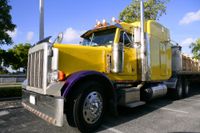
When drivers stop at gas stations, they typically fill up with one of two options: gasoline or diesel. But, there are also other types of fuel, some of which are made from renewable resources. For daily commuters, cross-country truckers, and everyone in between, learning about the different types of fuel can help drivers become more knowledgeable about their options.
5 Fuel Types for Cars & Trucks
1. Gasoline
Gasoline accounts for 54% of the energy used for transportation across the U.S. and is commonly used in cars, light trucks, and motorcycles. It’s affordable and readily available at gas stations, and many drivers continue to purchase vehicles powered by this traditional fuel source.
2. Diesel
Diesel is a common fuel choice for large vehicles, including heavy-duty trucks, buses, and tractor-trailers. In addition to the type of diesel found at gas stations, there’s also a variety used specifically to power off-road vehicles.
3. Ethanol
 Ethanol is a biofuel made from naturally occurring resources, including corn and sugarcane. In many cases, the fuel is used as an additive to gasoline. With that said, new car models are emerging that can run on ethanol exclusively.
Ethanol is a biofuel made from naturally occurring resources, including corn and sugarcane. In many cases, the fuel is used as an additive to gasoline. With that said, new car models are emerging that can run on ethanol exclusively.
4. Biodiesel
Biodiesel is an alternative to the standard version made from fossil fuels. It’s created with animal fats and can even be produced with algae. Palm, grapeseed, and vegetable oils are other popular components of biodiesel.
5. Compressed Natural Gas
Buses, trucks, cars, and ships can use natural gas, but it’s typically reserved for government applications and private vehicle fleets. This fuel source is odorless and clear and requires a special internal combustion engine to power vehicles.
Whether your car or truck runs on gasoline or diesel, you can fill up at Tri-Mart BP in Tripoli, WI. With fuel pumps operating 24/7, you can rest assured you’ll make it to your next destination with this convenient gas station. They also offer an ATM, hot food and snacks, and beer, wine, and liquor. Find out more about their services by visiting their website or calling (715) 564-2440.
About the Business
Have a question? Ask the experts!
Send your question

